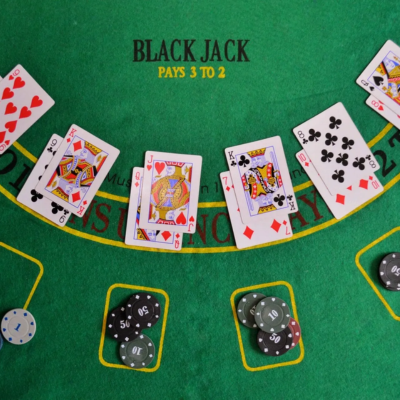Card meanings – joker, trump, and queen of spades
Card meanings about the mysterious queen of spades, foolish jokers, and the "king" of all cards – the trump card. Card meanings: the card of…
Universal, simple, popular, sports and gambling card games are an integral part of weekend gatherings. They brighten long winter evenings. They make warm summer afternoons fun. Trips with friends become even more interesting.
These card games are very easy to learn, they do not require developed logical thinking or complex calculations. Moreover, card games can be played by both adults and children, as they greatly enhance thinking, memory, teach counting, and develop imagination.
There are a multitude of card games – played by two, ten, or sometimes even a single player!
Card meanings about the mysterious queen of spades, foolish jokers, and the "king" of all cards – the trump card. Card meanings: the card of…
How many players play? This card game can be played solo to "exercise your brain" or with any number of friends, competing to see who…
The card game Whist, whose history suggests that one of the earliest variants found in historical sources around 1529 was called "Triumph" (English: Trump -…
How many players play? "Makao" can be played by 2 to 10 players. Required materials for the game It is usually played with a standard…
Pokemons – colorful and very fun fictional heroes and fighters living in the Pokemon world. Born in 1995 as computer game characters. Their creator Satoshi…
Yu-Gi-Oh game - Let's start! Besides your Yu-Gi-Oh card deck, you will need a few additional elements to play the game. So, you will need…
History and Versions of Bridge There is no consensus on the exact origin of this game. Some believe that bridge originated from whist, an ancient…
Card Game 66 Rules The card game 66 is played with a partial deck of only 24 cards (from nines to aces). The order of…
The card game King is widely played in various parts of the world – known in France, Belgium, Italy, and especially popular in Portugal, Russia,…
Even 5 different and very simple card games that you will learn and understand easily and quickly. No notes needed, just grab a deck of…
 Traditional Games
Traditional GamesVarious traditional card games have been created – the first ones were played by our grandparents or parents, such as “Karuselė,” “Vežimas,” or “Durnius.” These games, passed down and learned from generation to generation, are well known to many.
Traditional, simple games are played with a standard deck of cards, usually consisting of 52 cards, but there are also games that use specialized cards. Some of these games include “Uno,” “Yu-Gi-Oh,” or “Magic.”
Interesting! In many countries, different card games exist, which become established depending on the historical heritage, cultural, and even economic differences of the country.
Clockwise or Counterclockwise?
In different parts of the world, as mentioned, there are different game rules and playing methods. One of the most interesting differences is the direction of play.
Games are played clockwise in North America and Australia, while counterclockwise in most of Asia and Latin America. Europe is divided in half – more to the north play clockwise, and to the south – counterclockwise.
Trick-taking games are based on card ranks, where a certain (usually higher) value card wins over another card, thus earning and collecting points.
The rules of the game vary depending on the specific game – for example, in some games, you need to collect as many tricks as possible, in others, using tricks, collect as many high-value cards as possible. In others, collect as few tricks as possible or a certain number of them. “Bridge,” “Whist,” “500,” and many others are traditional trick-taking games played worldwide.
The main goal of “Rummy” and many other card matching games is to collect a sequence or pair of cards of a certain color/sequence/rank before your opponent. One of the most popular such games is “Rummy” or “Mahjong.”
The goal of these card games, as you might guess from the name, is to discard all the cards in your hand as quickly as possible.
One of the most popular games of this type is “Uno,” as well as several “Rummy” variants.
The goal of card collecting games is to collect all the cards on the table. These are most of the “War” type games, such as “Slapjack” or Egyptian “Ratscrew.”
In these games, you play with cards in your hand and cards on the table. The goal is to pair, in other words, “catch” the required card. This type of game is especially popular in China, where countless card fishing game variants have been created, while in Italy, the game “Scopa” is even considered national!

These are games where the cards dealt/collected during the game often determine the winner. The value of the collected cards is calculated. Such a game is often called an “open card” or “competitive” game.
Moreover, most of these games are now called gambling games because they are played for money.
Some of the most popular such games are “Baccarat” or “Blackjack.”
These games are usually intended for one player, whose goal is to arrange the cards into “stacks” according to certain rules, rank, or suit. There are countless variants of this game, played both with a standard deck of cards and online.
These games are often played at parties. The goal of the game is to make a player drink or have to drink yourself. Almost any card game can be called a “drinking” game if players come up with their own rules – winning, losing, or betting.
Moreover, it’s interesting that we can also purchase special cards for such “fun” games.
There are quite a few card games that combine several playing methods – card collecting, discarding, or trick-taking.
The most common rule variants are card matching and discarding, for example, several “Rummy” variants, “Old Maid,” or “Old Fishing.”
In this case, it’s more about collecting special cards than playing a game.
The goal is to collect the most expensive/impressive/valuable deck of cards from various values and types. Cards are often shared or sold. Impressive card deck collections are sometimes even kept in museums and, of course, protected in personal collections.
 Poker Games
Poker GamesPoker is a family of sports/gambling games. Poker is characterized by betting (usually with chips, in casinos – with money), deceiving the opponent (bluffing).
After playing a hand, players reveal their cards, and the winner is declared as the one whose hand (combination of cards) is of the highest value.
There are many variants of the game, and they often depend on how the cards are dealt and how players can “improve” the values they hold in their hands.
Poker games are some of the most well-known card games worldwide.
In these games, the card values do not correspond to their true value and meaning. These cards are intended for “simulation” and represent a specific action, such as a goal in a card football game.
Most games, including card games, are created based on the works of science fiction and other genre writers, which are highly favored by readers. These games can be classified as board games when the gameplay becomes longer, and the plot and rules become even more interesting.
Thus, movie or series fanatics can find their favorite card game!
An integral and one of the most important parts of card games are sports and gambling games. The main nuance of these games is betting. Essentially, you can bet in every card game, but there are some special games where betting becomes a strategic part of the game. Players bet against each other or against the house, trying to catch luck and even amass considerable wealth!
One of the most widespread types of card games is sports games. Card game tournaments are held worldwide, with Poker, Bridge, and Preference clubs uniting enthusiasts of these games.
These games are quite complex, requiring strategic thinking, analytical skills, or even knowledge of psychology, as the players’ goal is to see through opponents and defeat them using mental abilities and psychological knowledge. Often, cards in these games are just a means to express sporting interest.
Some sports games are often associated with gambling. There are several fundamental differences between these two types of card games. Gambling games are played for money and usually in casinos.
Here, you play not against opponents but against the house and according to their own set rules. Clearly, in such cases, the house has a guaranteed advantage.
Sports games are played against opponents, and tournaments are mediated by game clubs and federations – they set the rules. These games are played not for money but to defeat opponents.
Players participating in tournaments pay entry fees, and winners receive cash prizes.
Gambling has accompanied humanity since the times when we were hunters living in caves. Archaeological research reveals that the passion for gambling is one of the earliest human weaknesses.
Of course, the history of gambling does not begin with beautifully painted cards but with objects similar to dice – dog or sheep ankle bones, called astragals, which date back 40,000 years!
More than 4000 years ago, the Chinese invented a tile-based game of chance, ivory dice were found in Egypt, dating back about 3500 years. Written sources state that Greeks and Romans also enjoyed rolling dice.
Later, in the 16th century, gambling moved to Europe. King Henry VIII of England had many earthly vices – he liked other women, alcohol, and gambling. It is said that he gambled for the lives of his second wife and her brother when he decided to punish them with the death penalty.
However, the king banned gambling when he learned that his soldiers spent most of their time having fun rolling dice instead of preparing for important battles.
The first casino games, such as Baccarat, appeared in the 15th century in Italy; “21” became popular in the 18th century in France, and the king of all games, Poker, flourished in the 19th century in New Orleans.
In 1793, U.S. President George Washington legalized lotteries by law, and this form of gambling became one of the most popular, so over the years, the number of national lotteries only increased. It is important to note that not all lotteries and gambling were organized fairly and legally, posing a risk of losing a lot of money. Swindlers were not afraid, even of lynching… Society gradually began to view gambling with distrust.
In the 19th century, in the 4th decade, swindlers who fled from the southern to the northern U.S. states began to establish places then called “wolf traps” or “10 percent houses.”
Interestingly, such metaphors arose for a reason. It was precisely the swindler gamblers who opened the first gambling houses. One of their invented cheating methods, preventing winning, was called the horsehair game – one of the accomplices would distract the players’ attention, while another would swap cards and chips with a horsehair tied to a coat button.
After the U.S. Civil War, lotteries decreased, and in 1910, organizing gambling in Nevada was declared a criminal activity. However, those who loved gambling were not stopped – they played underground and ignored the bans. It took just a few decades until the first casino houses emerged in 1931, and horse racing betting spread.
Later, gambling houses began to expand rapidly, new games with simple rules (“21”, “Texas Poker”) appeared, which were highly favored by gamblers. They contributed to the flourishing of Las Vegas, the largest city in Nevada.
 Today, gambling card games can be played everywhere:
Today, gambling card games can be played everywhere:on websites, with friends, in small and large casinos. Casino games have certain special rules.
First of all, they are played at a special table, where it is marked where the player should sit, where the card dealer, called the banker, should place the cards, and where to place the bets – chips.
Sometimes even the bet amounts and winning ratio, as well as the minimum amount that can be won, are written down.
When playing at home, you may not need to buy a special table, but to feel the true joy of the game, arrange the cards according to the rules.
One of the most important places in casino games is the banks, where the sums of money bet by players during the deal are kept.
The banker takes care of the bank – depending on the game rules, this role can be assigned to a different player or the casino if you are not playing at home with friends. If you play gambling games in a casino, the cards will be dealt, and the money counted by the croupier.